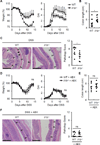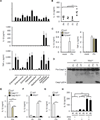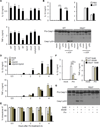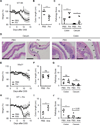Distinct Commensals Induce Interleukin-1β via NLRP3 Inflammasome in Inflammatory Monocytes to Promote Intestinal Inflammation in Response to Injury
- PMID: 25862092
- PMCID: PMC4408263
- DOI: 10.1016/j.immuni.2015.03.004
Distinct Commensals Induce Interleukin-1β via NLRP3 Inflammasome in Inflammatory Monocytes to Promote Intestinal Inflammation in Response to Injury
Abstract
The microbiota stimulates inflammation, but the signaling pathways and the members of the microbiota involved remain poorly understood. We found that the microbiota induces interleukin-1β (IL-1β) release upon intestinal injury and that this is mediated via the NLRP3 inflammasome. Enterobacteriaceae and in particular the pathobiont Proteus mirabilis, induced robust IL-1β release that was comparable to that induced by the pathogen Salmonella. Upon epithelial injury, production of IL-1β in the intestine was largely mediated by intestinal Ly6C(high) monocytes, required chemokine receptor CCR2 and was abolished by deletion of IL-1β in CCR2(+) blood monocytes. Furthermore, colonization with P. mirabilis promoted intestinal inflammation upon intestinal injury via the production of hemolysin, which required NLRP3 and IL-1 receptor signaling in vivo. Thus, upon intestinal injury, selective members of the microbiota stimulate newly recruited monocytes to induce NLRP3-dependent IL-1β release, which promotes inflammation in the intestine.
Copyright © 2015 Elsevier Inc. All rights reserved.
Figures







Comment in
-
Proteus mirabilis: The Enemy Within.Immunity. 2015 Apr 21;42(4):602-4. doi: 10.1016/j.immuni.2015.04.004. Immunity. 2015. PMID: 25902478
References
-
- Bauer C, Duewell P, Lehr HA, Endres S, Schnurr M. Protective and aggravating effects of Nlrp3 inflammasome activation in IBD models: influence of genetic and environmental factors. Dig. Dis. 2012;1(30 Suppl.):82–90. - PubMed
Publication types
MeSH terms
Substances
Grants and funding
LinkOut - more resources
Full Text Sources
Other Literature Sources
Molecular Biology Databases

